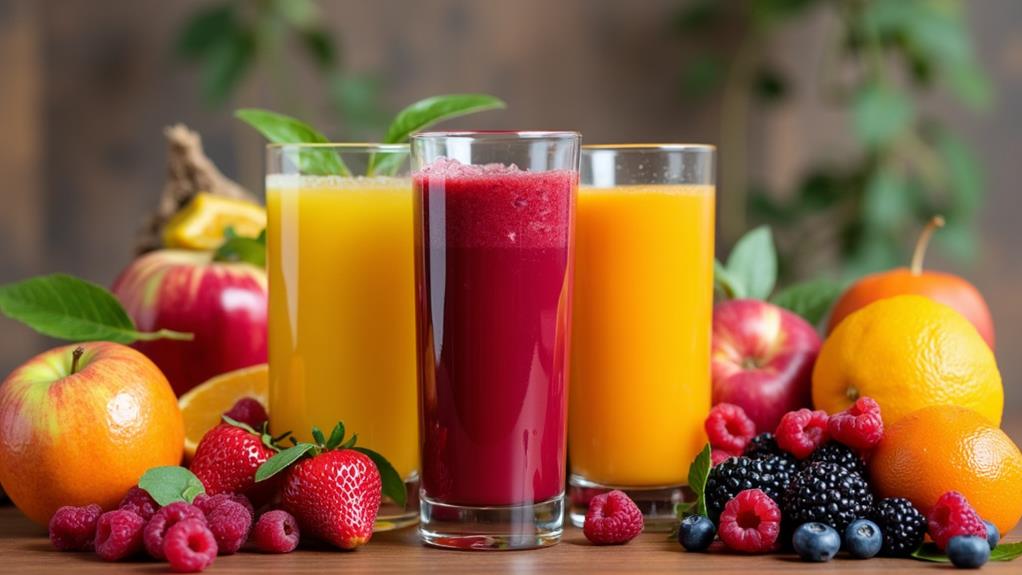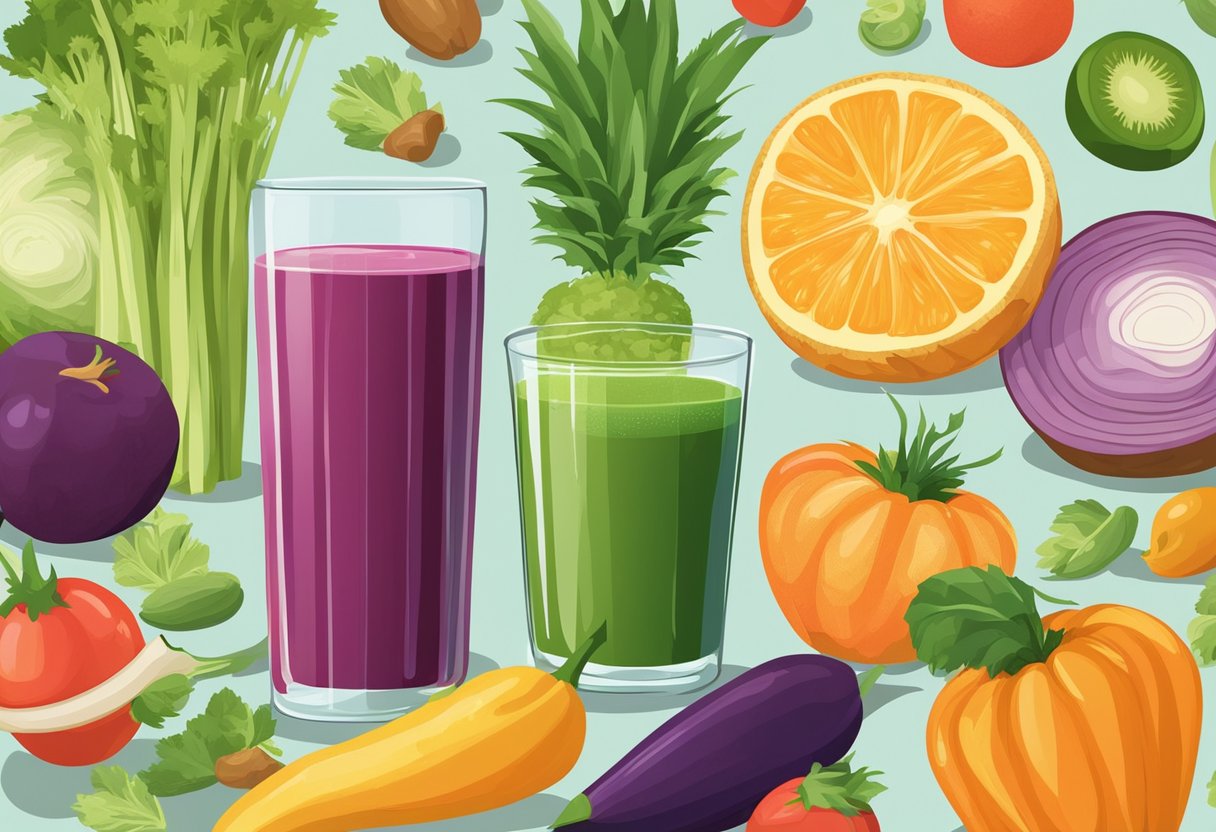Hemp Seed Juice: Protein and Healthy Fats for Skin and Heart Wellness
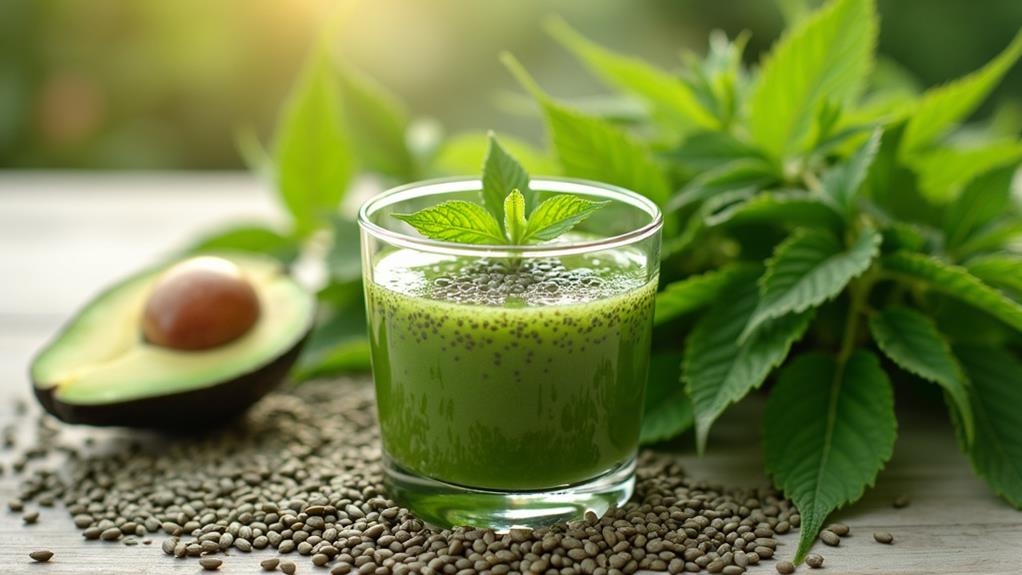
Hemp seed juice is a powerhouse of protein and healthy fats that can work wonders for your skin and heart. With about 9.5 grams of protein per serving, it's comparable to animal proteins, supporting muscle repair and maintaining satiety. The 14.5 grams of healthy fats offer a perfect omega-3 to omega-6 balance, essential for skin hydration, elasticity, and heart wellness. Regular intake can improve your skin's radiance and protect against heart disease by reducing inflammation. By incorporating this nutrient-rich juice into your diet, you may reveal more remarkable health benefits for your skin and cardiovascular system.
Nutritional Composition of Hemp Seed Juice
Hemp seed juice, a nutritional powerhouse, is derived from cold-pressed hemp seeds and is packed with important nutrients. You'll find it's rich in protein, providing about 9.5 grams per 30-gram serving, which supports muscle repair and growth. The nutritional composition doesn't stop there; it's loaded with approximately 14.5 grams of healthy fats, critical for energy and cellular function. Significantly, hemp seed juice maintains an ideal omega-3 to omega-6 fatty acid ratio of 3:1. This balance is fundamental for heart health and reducing inflammation, making it a fantastic enhancement to your diet.
You're also getting a robust array of vitamins and minerals with each serving. Hemp seed juice is a good source of vitamin E, magnesium, and potassium. These nutrients contribute to overall wellness and are particularly beneficial for maintaining heart health. The antioxidant content in hemp seed juice plays a significant role in combating oxidative stress, supporting your body's natural defense systems.
Furthermore, hemp seed juice is low in carbohydrates and provides 1 gram of fiber, aiding digestive health. It's an excellent choice if you're following a low-carb diet, ensuring you get necessary nutrients without excess carbs.
Benefits for Skin Health
In regards to skin health, hemp seed juice offers a wealth of benefits. Packed with fundamental fatty acids like omega-3 and omega-6, it helps maintain skin hydration and strengthens your skin barrier. This means your skin stays moisturized, reducing the risk of dryness and irritation. Hemp seeds also contain gamma-linolenic acid (GLA), known for its powerful anti-inflammatory properties. By reducing inflammation, GLA can alleviate skin conditions such as eczema and psoriasis, making your skin feel more comfortable.
Antioxidants found in hemp seed juice play a significant role in protecting your skin from damage caused by UV exposure. They support collagen production, promoting skin elasticity and a youthful appearance. With regular consumption, you might notice your skin feels firmer and looks more radiant. Furthermore, hemp seed juice can help regulate oil production, which could reduce the severity of acne and minimize irritation.
A study from 2005 highlighted hempseed oil's ability to improve fundamental fatty acid levels in patients with eczema, showcasing its potential to improve overall skin health. By incorporating hemp seed juice into your routine, you're supporting your skin's vitality and resilience.
Enhancing Heart Wellness
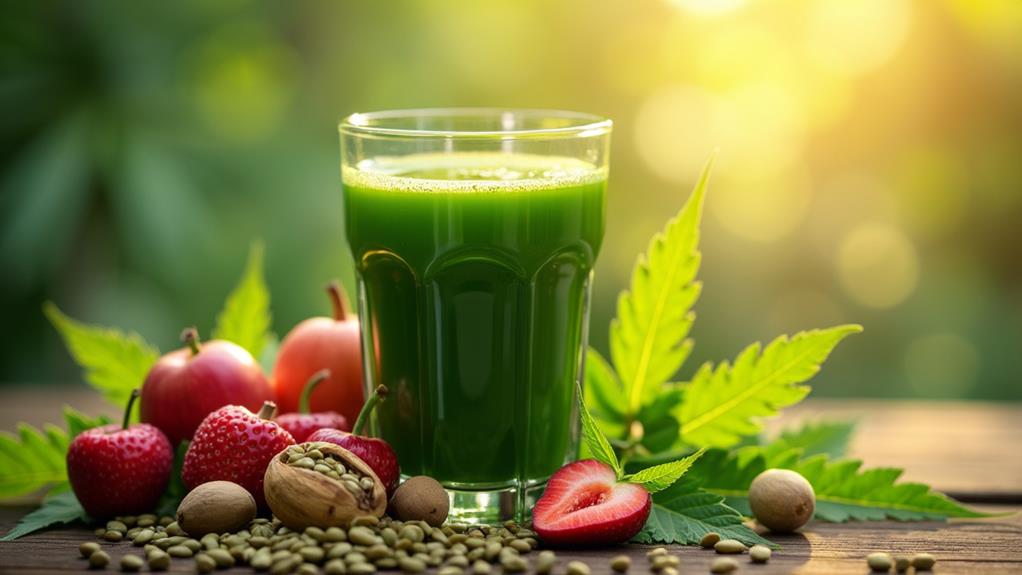
With a powerhouse of nutrients, hemp seed juice plays a crucial role in enhancing heart wellness. If you're looking to support your heart health, hemp seeds are a fantastic choice. They boast a prime omega-3 to omega-6 fatty acid ratio of 3:1, which is known to promote heart function and reduce inflammation, a key factor in many cardiovascular issues.
The high arginine content in hemp seeds is another heart-friendly component. Arginine aids in the production of nitric oxide, which helps dilate blood vessels, potentially lowering blood pressure and improving general cardiovascular wellness. A 2023 study highlighted a significant link between increased arginine intake from hemp seeds and improved cardiovascular outcomes, underscoring their heart health benefits.
Moreover, hemp seeds contain gamma-linolenic acid (GLA), which may further reduce inflammation and lower the risk of heart disease by decreasing C-reactive protein (CRP) levels. Regular consumption of hemp seeds could also lead to lower cholesterol levels, further supporting heart health and reducing the risk of heart-related conditions. By incorporating hemp seed juice into your diet, you're taking a proactive step towards a healthier heart.
Anti-Inflammatory Properties
Thanks to their rich content of gamma-linolenic acid (GLA), hemp seeds are celebrated for their potent anti-inflammatory properties. This omega-6 fatty acid is known to help reduce symptoms of conditions like arthritis and heart disease. When you consume hemp seeds, you're not just adding healthy fats to your diet; you're supporting your body's ability to manage inflammation. The seeds boast a well-balanced omega-3 to omega-6 ratio, approximately 3:1, which supports comprehensive inflammatory response, promoting both heart health and skin health.
Hemp seeds' omega-3 fatty acids play a significant role in alleviating acne symptoms and improving general skin health. By incorporating these seeds into your diet, you may notice a decrease in C-reactive protein (CRP) levels, which is a marker of inflammation linked to chronic diseases. The antioxidants in hemp seeds, combined with their healthy fats, offer protection against oxidative stress, further reducing inflammation in cardiovascular tissues.
Dietary Protein Source
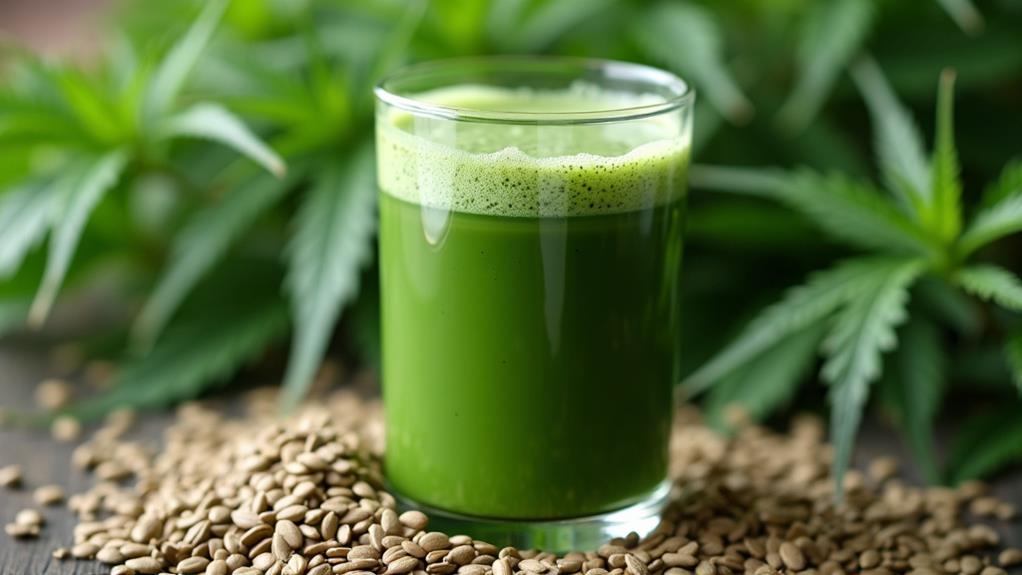
Hemp seeds stand out as a powerhouse of nutrition, offering a complete protein source with all nine vital amino acids. With approximately 9.5 grams of protein per 30-gram serving, hemp seeds provide a robust dietary protein source that's comparable to animal proteins like beef and lamb. This makes them an excellent choice for those seeking plant-based protein alternatives. The protein content in hemp seeds doesn't just support muscle health and recovery; it also promotes satiety, helping with weight management by reducing total calorie intake.
Incorporating hemp seeds into your diet can yield several benefits for heart wellness and skin health, thanks to their healthy fats and easily digestible protein. Here are three compelling reasons to evaluate hemp seeds as your go-to dietary protein source:
- Complete Protein: They provide all the fundamental amino acids your body needs, making them a reliable plant-based protein option.
- Digestibility: The protein in hemp seeds is easily absorbed, ensuring you get the most out of their nutritional benefits.
- Versatility: Regardless of being vegan or just exploring new protein sources, hemp seeds seamlessly integrate into numerous meals, supporting both health and culinary creativity.
Incorporating Hemp Seed Juice
Release the potential of hemp seed juice by incorporating it into your daily diet for a flavorful and nutritious improvement. Start your day with a smoothie that includes hemp seed juice for a protein increase, as it contains approximately 9.46 grams of protein per 30 grams of hemp seeds. This can help maintain your energy levels and support muscle health. The juice retains the healthy fats found in hemp seeds, offering a balanced ratio of omega-3 and omega-6 fatty acids, which are vital for heart health.
For lunch or dinner, consider including hemp seed juice in your salads or dressings. It improves the nutritional profile with crucial vitamins and minerals, including vitamin E and magnesium, known for their antioxidant properties. These antioxidants support heart and skin health, contributing to comprehensive well-being.
Incorporate hemp seed juice into your soups or sauces. Its high gamma-linolenic acid (GLA) content supports skin health, especially for those with conditions like eczema, due to its anti-inflammatory properties. Furthermore, its protein and fiber contribute to satiety, aiding digestion and weight management. By diversifying your meals with hemp seed juice, you'll enjoy numerous health benefits.
Potential Risks and Considerations
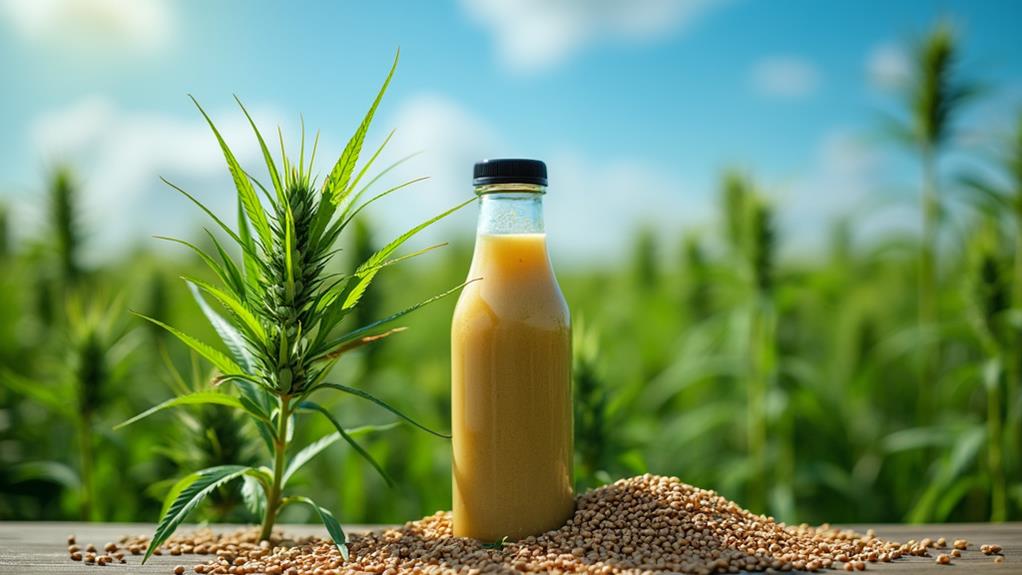
While incorporating hemp seed juice into your diet offers a variety of health benefits, it's important to reflect on some potential risks and factors. Initially, if you're on anticoagulant medications, be cautious. The omega fatty acids in hemp seeds may interact with these medications, potentially affecting their efficacy. Consult your healthcare provider to verify it's safe for you.
Secondly, although hemp seeds contain negligible THC, trace amounts might still be present. If you're sensitive to cannabis or undergoing drug testing, this is something to think about. These trace levels are unlikely to cause psychoactive effects, but awareness is key.
Finally, reflect on the potential for digestive issues. Rapidly increasing your intake of hemp seed juice can lead to gas or diarrhea. To avoid this, start with small amounts and gradually increase your consumption.
Additionally, the high caloric density of hemp seed juice means moderation is vital, especially if you're focused on weight management. Pregnant or breastfeeding individuals should also seek medical advice before adding hemp seed juice to their diet, as the effects on these groups aren't well established. Balancing these considerations can help you enjoy the health benefits safely.
Evaluating Product Quality
When you're choosing hemp seed juice, prioritizing quality is vital. Start by ensuring hemp is the primary ingredient. This guarantees you're getting the full benefits of hemp seeds, known for their healthy fats and protein content. High product quality often comes from organic, sustainably sourced hemp seeds, reducing the risk of pesticide exposure and enhancing nutritional value.
Next, check for third-party testing and certifications. These confirm the absence of contaminants like THC and heavy metals, ensuring the safety and integrity of your hemp seed juice. Reliable certifications are a mark of high-quality products.
Review the nutritional information closely. The best hemp seed juice should offer ample amounts of protein, omega-3, and omega-6 fatty acids per serving. These nutrients support skin and heart health, making them key components of the juice.

